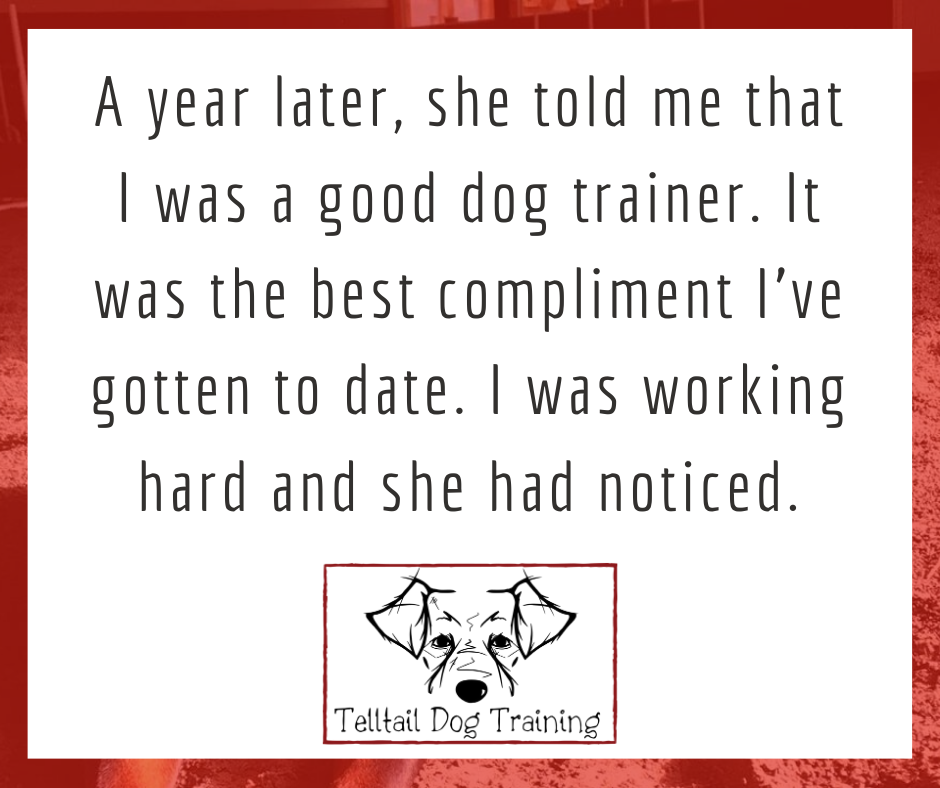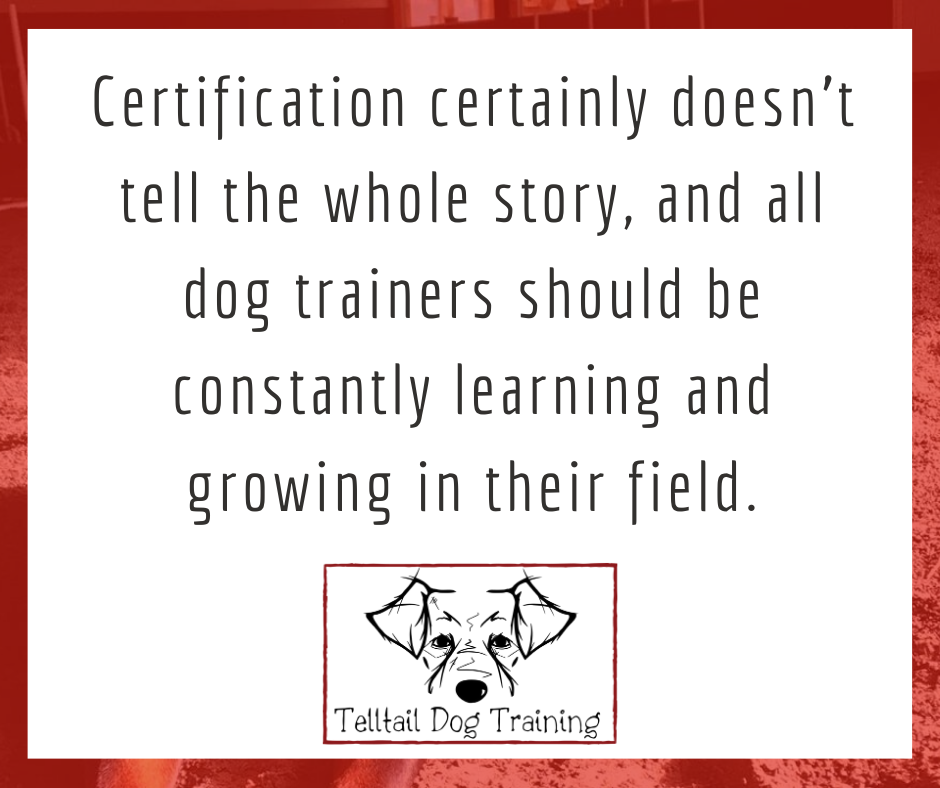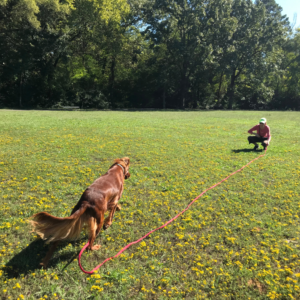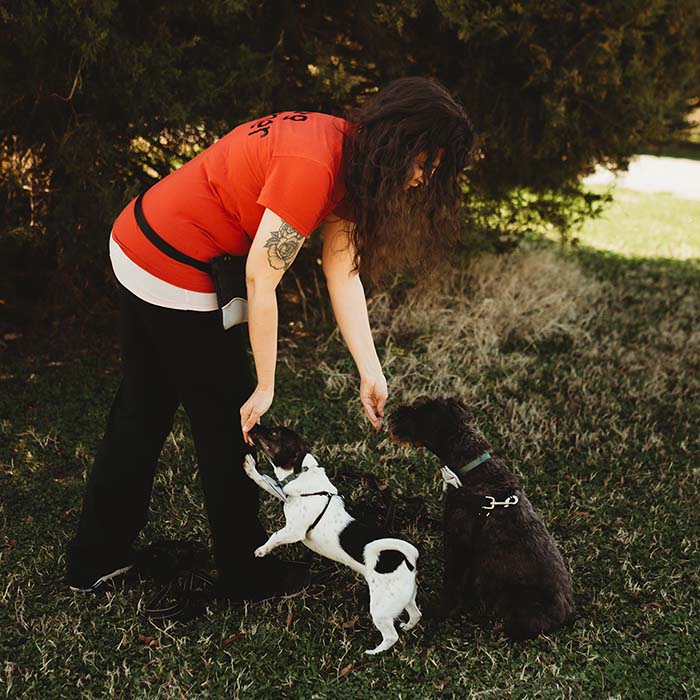Dog Training Certifications
What do dog training certifications mean?
I like picking up other trainers’ cards. I find them at local rescues, pet shops, and doggy bakeries. I’m looking at the design, the certifications. I’ll check out their websites and social media. Some designs are pretty cool, others have similar methodologies to mine, and I’m always looking to connect with other trainers. It’s also how most people find their trainer, and how some of you found me.
I’ll look up the certifications if I haven’t heard of them to see if it’s a test or educational-component or if merely a fee-based membership.
Anyone can order up some $10 Office Depot business cards, set up a Facebook page, and be in business as a dog trainer. Those in the industry call it “hanging a shingle”, an idiom that means opening up a business or office. Unlike becoming a veterinarian, for instance, a profession that requires years of study and an actual degree, establishing oneself as a dog trainer can be as little as saying, “Oh, I’m a dog trainer.”
That’s it.
There’s no regulatory structure.
There are some pathways to follow that are more structured. Traditionally, many dog trainers get their start as an unpaid apprentice or intern. They’ll shadow lessons or classes before getting started as a class assistant. They simply show up, a lot, until the veteran dog trainer starts giving them more responsibility. There’s also the Petco or Petsmart route, which offers structured training for aspiring dog trainers, often resulting in an accreditation through a national program.
Then there’s what I did: a paid internship on a farm with a prestigious trainer named Nicole Larocco-Skeehan who has been working on rescue, prison training programs, and her own business for 20 years. She wrote her first book a few years ago and she’s been featured on National Geographic.
I got lucky.

She even told me a year or so later that she wasn’t sure I’d make it and that I was a good dog trainer. It’s the best compliment I’ve gotten to date. Because it was a lot of work to get here, and it was noticed.
I was taught, on the farm, with the methods of the Certification Council for Professional Dog Trainers, a program trying to mainstream a process for dog trainers. I’ll be sitting for the test this spring, having accumulated nearly 800 hours over the required 300 hours in the past two years. I’ve handled hundreds of dogs, read so many books. And I want to formalize what I’ve learned with the test that is 250 questions ranging from husbandry to classes to training methods and tools.
But the CCPDT isn’t the only option out there.
Additional options can include:
- AKC Canine Good Citizen and STAR Puppy Evaluator
- American Kennel Club evaluators must have two years of experience as a dog trainer. They train and test according to AKC standards and are providing with the testing tools to do so. CGC and STAR are often excellent starting points for therapy, agility, or rally training.
- International Association of Canine Professionals (IACP)
- This is a common one, especially in the Little Rock area, mainly because anyone can purchase a membership without certification or testing of any sort. A professional member is an individual who has five years of experience, while an associate member is someone with under five years of experience. Affiliate members simply have an interest in pursuing a career in the industry.
- Association of Animal Behavior Professionals (AABP)
- This is less common, even nationwide, as this is often attached to much more advanced degrees and an understanding of animal psychology. A trainer is someone who can teach and guide certain behaviors, and you’ll find that fewer trainers specialize in issues like aggression or anxiety (like separation or fear-based behaviors). When there are serious issues or a behavior is complex, often a behaviorist is a better fit than a dog trainer. A behaviorist, similar to a veterinarian, may be able to prescribe medications to help manage behaviors. Dog trainers tend to start with making sure the dog is healthy, then modifying the environment, then working on training. Once a dog goes to a behaviorist, a dog owner has often exhausted all options with a trainer. As far as I am aware, there are no behaviorists in Arkansas currently.
- Animal Behavior College Certification (ABC)
- I’ve met a few people who have completed ABC training and become a certified trainer through their program. This option tends to start with theory first, then they connect students to a trainer mentor nearby to put into practice their methods, often shadowing lessons and classes. This is a swap of how I learned, which was hands-on immediately, followed up by lots of learning and theory. Neither is necessarily right or wrong on how to start, but personally I’ve found that theory makes a whole lot more sense when you’ve seen the behavior first, then where it comes from and how to work with it.
Looking at a trainer’s website, social media, and certifications is a starting point to figuring out what trainer might be the best fit for you. There are also some other things to consider. For example, some dog owners would like a trainer with many more years of experience than I have. I only recently became eligible to teach Canine Good Citizen and STAR Puppy classes. There are lot of other people with more years on me, and I refer to those folks when needed and when I’m confident in their approach.

Certification certainly doesn’t tell the whole story, and all dog trainers should be constantly learning and growing in their field.
Here are some additional questions to consider when selecting a dog trainer:
- What’s important to you? Is it a certain type of training style? Building a relationship with your dog? Having a more harmonious home?
- What’s the trainer’s personality like? Does it mesh with yours? It’s perfectly fine to find someone you enjoy being around.
- How do they teach you? Does it work with how you learn best? Do they hear your frustrations? Are they paying attention?
- How are the dog trainer’s values? Do they match yours?
- Do they have experience with a lot of different dogs? Can they adjust their teaching methods if something isn’t working? How well do they problem solve?
- Can they explain what they’re doing and why? Can they teach you how to do it?

My ultimate goal as a trainer, is to teach my clients how to communicate with their dogs and to understand where behaviors can originate. Dogs can do some really cool things when we have a good foundation of training. Putting in the work builds trust and a relationship for years to come, regardless of previous expectations.
I work hard on finding the balance of not only challenging myself, but also my clients when the situation calls for it. I also want to refer out if I’m not able to help. I fully encourage choices based on education, not fear, which includes on what methods you use to train and which trainer you pick. If you feel uncomfortable with a method but feel you need to do it because a trainer has 20 years of experience and all you have is your first dog as an adult, then explore and research that method a bit more first. Try to figure out why you’re uncomfortable. Is it because it’s difficult and doesn’t feel natural to you as you learn, or is because you see that it is negatively impacting your dog in a way you don’t like? Or something else?
Additionally, spend some time figuring out what you’d like your dog to do and what you’d like the rules of your house to be. Then call some trainers and see what’s possible.
Next week: What’s all this about doggy daycares? There’s a huge amount of options in the Little Rock area, including a few that bill themselves as “kennel free”. It’s a craze that has been sweeping the nation for quite some time now, and I worked for one for six months here in Little Rock. I talk with dog trainer Nicole Larocco-Skeehan, dog trainer and owner of Philly Unleashed, on how to decide if a daycare is a good fit for your dog, and I share my personal experience regarding the good, the bad, and the downright ugly.
Group classes take place every Saturday at SoMa Animal Clinic. I also offer private in-home lessons in the Little Rock area. I recently added training walks for current clients. Email me at info@telltaildogtraining.com for more information.



